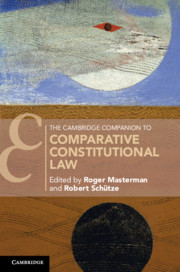Book contents
- Reviews
- The Cambridge Companion to Comparative Constitutional Law
- Cambridge Companions to Law
- The Cambridge Companion toComparative Constitutional Law
- Copyright page
- Contents
- Notes on Contributors
- Acknowledgements
- Table of Cases (Selection)
- Abbreviations
- Introduction
- Part I Theoretical Foundations
- Part II Historical Experiences
- Part III Constitutional Principles
- Part IV State Institutions
- Part V Transnational Constitutionalism
- 18 Multi-Layered Constitutions
- 19 International Constitutionalism
- 20 European Constitutionalism
- 21 A New Commonwealth Constitutionalism?
- 22 Constitutional Transplants
- Index
- References
21 - A New Commonwealth Constitutionalism?
from Part V - Transnational Constitutionalism
Published online by Cambridge University Press: 30 September 2019
- Reviews
- The Cambridge Companion to Comparative Constitutional Law
- Cambridge Companions to Law
- The Cambridge Companion toComparative Constitutional Law
- Copyright page
- Contents
- Notes on Contributors
- Acknowledgements
- Table of Cases (Selection)
- Abbreviations
- Introduction
- Part I Theoretical Foundations
- Part II Historical Experiences
- Part III Constitutional Principles
- Part IV State Institutions
- Part V Transnational Constitutionalism
- 18 Multi-Layered Constitutions
- 19 International Constitutionalism
- 20 European Constitutionalism
- 21 A New Commonwealth Constitutionalism?
- 22 Constitutional Transplants
- Index
- References
Summary
Until recently, standard accounts of the global constitutional landscape assigned the world’s constitutions to one of two dichotomous models for the constitutional protection of human rights: legislative supremacy or judicial supremacy. According to this binary taxonomy, the first model is characterized by the absence of any codified bill of rights and by the allocation of final authority on human rights questions to the legislative branch of the state. The second is characterized, to the contrary, by the presence of an entrenched and supreme law bill of rights, interpreted and enforced (including as against the legislature) by courts of some kind.1
- Type
- Chapter
- Information
- The Cambridge Companion to Comparative Constitutional Law , pp. 554 - 579Publisher: Cambridge University PressPrint publication year: 2019

